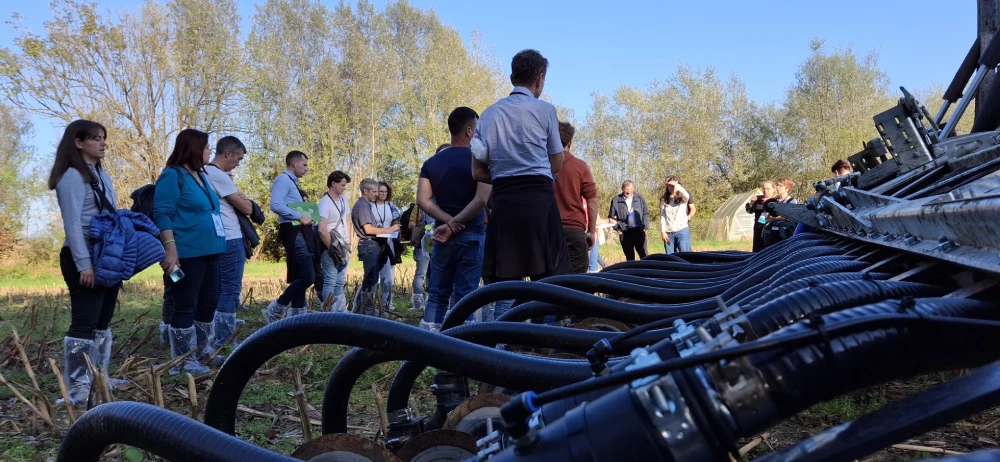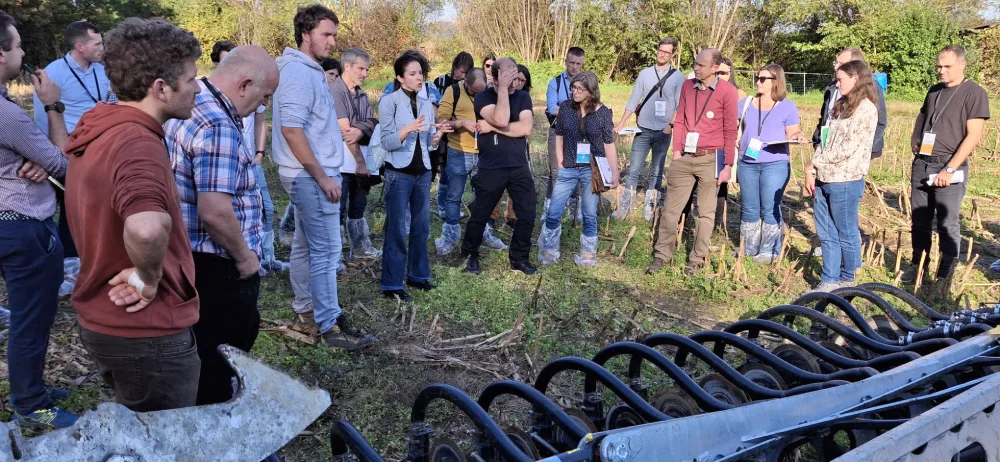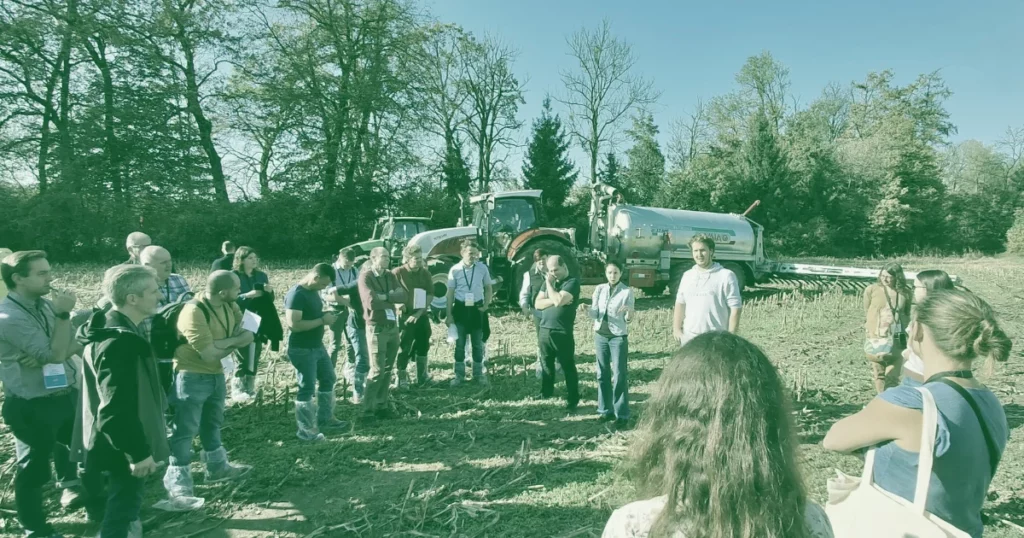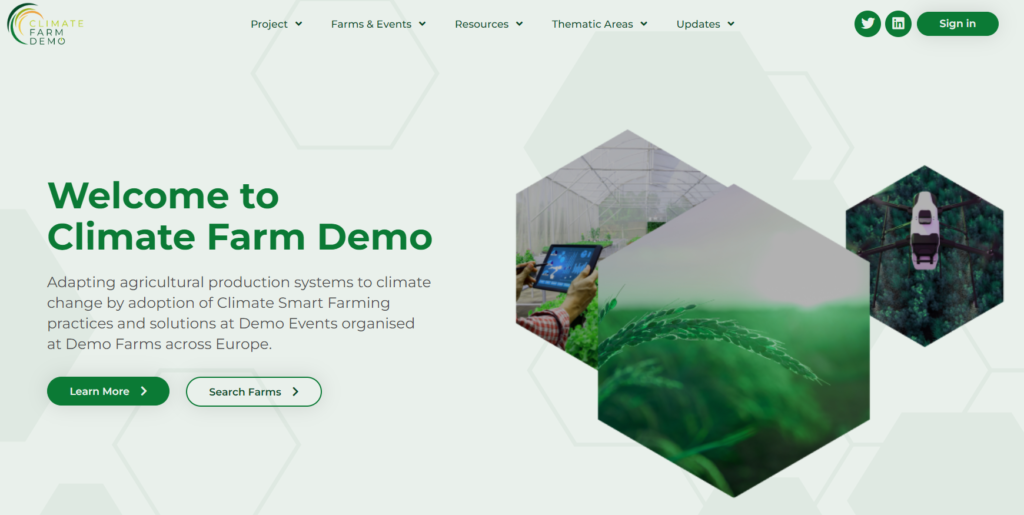Each visit included the distribution of observation cards to all attendees, covering key areas of focus: 1) climate-related issues demonstrated on the farm, 2) the use of farm data, 3) the incorporation of props, 4) suggestions for improvements for the host farmer, and 5) feedback for the Climate Farm Advisors (CFA). Visitors took time to observe these aspects and share their responses during the farm tours. As a gesture of gratitude for their warm hospitality, participants brought small gifts from across Europe to thank the farmers for opening their doors and sharing their experiences.
Farm Cajhen is a prime example of modern, sustainable agriculture in Slovenia. With 93 hectares of land—21 hectares of permanent grassland and 71 hectares of arable fields—the farm operates both as a dairy production facility and an agricultural contracting business, contributing 40% of its income. The farm’s dairy herd consists of 140-150 cows, supported by 130-140 heifers and calves, with an average annual milk production of 10,300 kg per cow, resulting in a total of 1.3 million kilograms of milk each year. “Our milk is supplied to an agricultural cooperative,” explains Bojan Cajhen, the farm’s owner. “Forty percent of our milk is used in the Slovenian market, while the remaining 60% is exported to Italy.”
The farm’s focus on efficiency is evident in its adoption of advanced technologies and breeding strategies. “We milk the herd on two robots as labor was an issue,” Bojan Cajhen, the farmer, shares. “We also use sexed semen on 90% of our herd, and the herd is genomic tested.” As a participant in the Climate Farm Demo project, Kmetija Cajhen is actively addressing the challenges of climate change with several mitigation and adaptation measures to lower its environmental footprint and boost productivity. These initiatives include the use of nitrification and methanogenic inhibitors in feed and fertilizers, aimed at reducing greenhouse gas emissions, which currently stand at 15,010 kg CO2 equivalent per hectare and 0.8331 kg CO2 equivalent per kilogram of milk produced.
The farm is also preparing to install a solar power plant on the barn roof to improve energy self-sufficiency, aligning with its broader goals of sourcing at least 50% of its energy from renewable sources, reducing methane emissions from animal husbandry, and increasing soil organic matter to 5% by 2029. “We try to adapt to climate change in all areas and farm with as little environmental footprint as possible,” says Bojan Cajhen. “At the same time, we ensure enough feed, the best possible quality feed, animal well-being, quality produce, and healthy soil.”
Kmetija Cajhen is a great example of how farms can balance productivity with sustainability. This commitment is evident through its continued efforts to innovate and improve its farming practices. The farm’s participation in the Climate Farm Demo project not only underscores its dedication to environmental responsibility but also highlights the collaborative approach the project promotes between farmers and advisors.
During the farm visit, participants provided valuable feedback to both the farm and the Climate Farm Advisor (CFA), contributing to the improvement of future farm demonstrations. Recommendations to Kmetija Cajhen included the following: improving cow comfort, especially in the cubicles; enhancing light levels in the barn; focusing on protein autonomy; and establishing a standard operating procedure for farm management data. Participants also suggested a more structured and informative tour, with an introduction followed by a walk through the farm where various issues and aspects could be explained in detail.
Feedback for the Climate Farm Advisor (CFA) emphasized the importance of maintaining time management, validating the information provided during the demonstration, providing more context about Slovenian agriculture, and ensuring balanced group sizes to allow for peer-to-peer learning. The feedback provided during the session will significantly contribute to improving both the farm and the demonstration process, ensuring future visits are more structured, engaging, and informative.
We are grateful to Kmetija Cajhen for their hospitality and for being part of the Climate Farm Demo network of farms, contributing to the broader goal of sustainable and climate-resilient agriculture across Europe.






